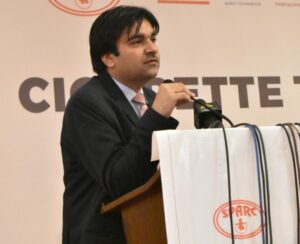93.6% of Respondents Support Increasing Tobacco Taxes to Protect Public Health and Economy
This survey clearly reflects public sentiment. The vast majority of Pakistanis recognize the devastating toll of tobacco use and want the government to act decisively to protect public health. DrKhalil Ahmad, Program Manager SPARC
Islamabad – Report Imrana Komal
A new public opinion survey conducted by the Society for the Protection of the Rights of the Child (SPARC) reveals overwhelming support among Pakistanis for increasing taxes on cigarettes and other tobacco products. Among 1,153 respondents surveyed nationwide, a striking 93.6% supported higher tobacco taxation, while also advocating for reduced taxes on essential items such as food and healthcare.

The survey aimed to gauge public opinion on shifting the country’s fiscal priorities—reducing the cost burden on necessities while increasing taxes on harmful products like tobacco. The findings demonstrate a powerful public consensus in favor of stronger tobacco control policies.
“This survey clearly reflects public sentiment. The vast majority of Pakistanis recognize the devastating toll of tobacco use and want the government to act decisively to protect public health,” said Dr. Khalil Ahmad, Program Manager at SPARC. “It is time to prioritize health over the profits of the tobacco industry.”
Dr. Ahmad highlighted that youth and low-income families are disproportionately affected by tobacco-related diseases and the associated financial strain.
“These results constitute a public mandate. Raising tobacco taxes while lowering the cost of essential goods is not only sound policy—it is a moral obligation,” he stated.

Tobacco use remains one of Pakistan’s leading public health crises, claiming more than 160,000 lives each year and costing the country Rs. 615 billion annually—equivalent to 1.6% of the national GDP.
“Every cigarette smoked is not just a personal health hazard—it’s a national economic burden,” Dr. Ahmad added. “That money could be better spent on education, healthcare, and development.”
SPARC emphasized that increasing tobacco taxation is among the most effective strategies to reduce smoking, particularly among youth and low-income populations. However, Pakistan’s current tobacco tax rates remain far below the thresholds recommended by the World Health Organization (WHO).
As the government is working on the upcoming national budget, SPARC urges policymakers to heed the public’s call and implement bold fiscal reforms to combat tobacco use.
“Prioritizing tobacco taxation is essential to building a healthier, more economically resilient Pakistan,” SPARC concluded.

